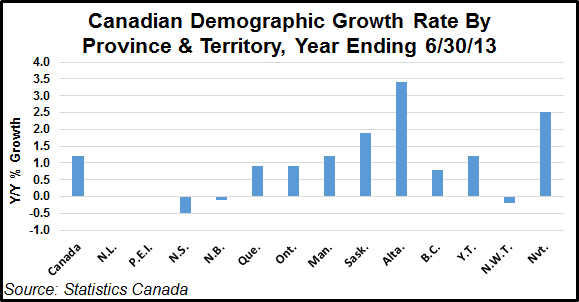Infrastructure | NGI All News Access | NGI The Weekly Gas Market Report
Nova Scotia Eyeing First CNG Shipments for Residential Use
The compressed natural gas (CNG) “pipeline on wheels” is about to get rolling in the hard-to-serve hamlets of Nova Scotia, and a place called Antigonish is bidding to become the first community in the province to use CNG to serve its homes and small businesses.

A local regulated gas distributor, Heritage Gas Ltd., has proposed building a station for re-gasifying truckloads of CNG and feeding it into a 7.5-kilometer distribution pipeline system it plans to build to serve the community of about 350 residential and small commercial customers. Initial deliveries are expected by next summer, a Heritage spokesman told NGI on Monday.
One public hearing on the proposal has been held and another one is scheduled for Oct. 6. Ultimately, the Nova Scotia Utility and Review Board must approve the project.
“We think this will be the first time, at least in Canada, that CNG will be used to serve residential customers,” the spokesman said. A university facility and hospital also are slated to be served. Full service to Antigonish will take two to three years, as the distribution piping job is completed, he said.
The population being targeted for CNG is about 40 kilometers from the nearest natural gas transmission pipeline running through the province, the spokesman said. “We determined it was uneconomic to build a lateral from that pipeline, costing $35-40 million,” he said.
Heritage currently serves a number of industrial customers on a regulated and unregulated basis. Irving Oil Co., Nova Scotia’s chief refiner, is serving one large industrial customer and has plans to service a number of coastal fish processors, hospitals, universities and other large commercial users (see Daily GPI, July 13, 2012).
Critics of the Heritage proposal think the gas supplier should be building a pipeline, noting that truckloads with their return trips add up to more than 4,000 trips annually. The company has maintained that it would be prohibitively expensive to build a pipeline from Pictou County to Antigonish.
Antigonish was identified for the first CNG community-wide service because of what the spokesperson identified as anchor customers: St. Francis Xavier University and St. Martha’s Regional Hospital.
The potential use of CNG, or any form of natural gas in Nova Scotia for that matter, is likely to be shaped by two conflicting market forces. On the one hand, as stated on the Nova Scotia Department of Energy website, natural gas use is still relatively new to the province. The website notes that Heritage was “formed for the purpose of operating a full regulation class natural gas distribution franchise in Nova Scotia. As of fall 2012, Heritage Gas was supplying natural gas for heat to approximately 18,000 families and 2,000 businesses. The customer base is growing at an annual rate of about 20%.”
But on the other hand, Nova Scotia’s general population is declining. According to Statistics Canada, Nova Scotia had 940,789 residents on July 1, 2013, down from 945,061 the year before. That 0.5% year-over-year decrease was the largest among all of Canada’s provinces and territories.
© 2024 Natural Gas Intelligence. All rights reserved.
ISSN © 1532-1231 | ISSN © 2577-9877 | ISSN © 1532-1266 |
